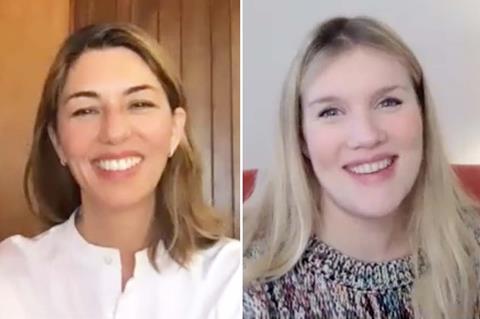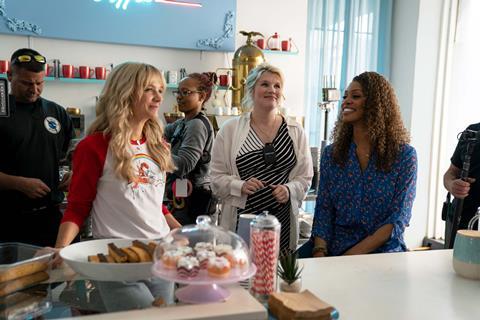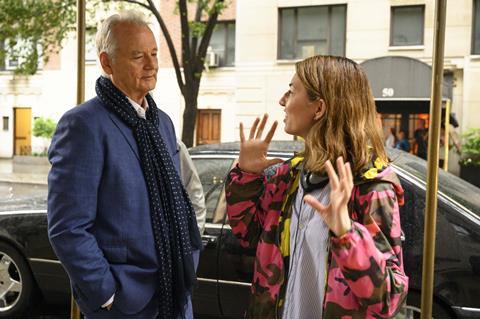Screen talks with the writer/directors of On The Rocks and Promising Young Woman, who find plenty of common ground when talking about commanding a film set, taking inspiration from actors and being unable to watch films that feature no women

As Sofia Coppola settles down to talk about On The Rocks on a Zoom call from Belize in Central America, she admits to feeling sheepish. It is a beautiful morning there and she is talking with Emerald Fennell, the first-time feature director of Promising Young Woman, who is tuning in from London. And London is gloomy this late afternoon in early 2021.
But a warmth spreads quickly down the international fibre-optic cables. Coppola is the veteran of seven features, an Oscar winner for best screenplay with Lost In Translation in 2004 and a personal favourite of Fennell who says Coppola’s The Bling Ring is one of her beloved films. In turn, Coppola is full of admiration for not only Promising Young Woman, but the BBC TV series Killing Eve, on which Fennell was the lead writer on series two.
Sofia Coppola: I was so surprised. I really did not expect the way your movie ended. I loved it.
Emerald Fennell: Thank you. It was a funny thing. [The ending] was the thing that was a big no for some people and a big yes for others.
Coppola: Did you know the film was going to end that way when you were writing it?
Fennell: Yeah, I did. Once she was in that room and she had a weapon, it just didn’t seem possible [that it wouldn’t end that way].
Screen: Sofia, what have you learned about running a film set since The Virgin Suicides in 1999?
Coppola: The day before a shoot I still feel as if it’s the first day before school. I’m nervous. Will I know what to do? Having weeks of preparation [helps] but then it has to all come together.
Figure out how you work. On my first film I remember the producer saying, “Where is your shot list for your first scene?” and trying to figure it out. But now I know part of my process is that when I get on set I need to see the actors rehearse the scene and what they want to do. Then I work with the DoP on how we’re going to cover it. I learned to trust my instincts and go with my gut.
Fennell: When The Virgin Suicides first came out, I had never seen anything like it. It felt so personal and had all the intensity of being a girl at that age. Do you think it was a good thing not to have done so much preparation and being told by other people how to do stuff?
Coppola: Definitely. You have to stay in a creative bubble and not get too many opinions. I remember when I was editing Marie Antoinette and my dad [Francis Ford Coppola] having opinions like, “You have to show more of Louis XVI,” and I was like, “It’s from her point of view.” He was looking at it from a male point of view. Stay as much as possible in your own little dreamy world.
The Virgin Suicides was the bug that made me want to be a director. I never was, like, “I want to be a director”. I read [the novel by Jeffrey Eugenides] and heard this guy was doing the movie and was making it really dark and violent and I thought, “No, I hope they don’t mess it up. It should be like this.” I could just see the way it looked in my head. That really motivated me to write the script, sort of as an experiment. Then I met the producers and said, “If anything falls through with the plan, please consider looking at my version.” And luckily they were cool and open-minded and gave me a shot. I had only done a short film but it was so clear in my head how I thought it should be done.

Screen: Emerald, you were seven months pregnant when you shot Promising Young Woman. What was the biggest challenge of that shoot?
Fennell: I was lucky in a sense that we had no time. We had a three-week prep and then we shot it in 23 days. Because of the nature of it, we were mostly changing location at the end of every day so you can’t drop a scene. You’ve just got to do it. There was no time to get inside my own head. I can’t imagine having $250m and years to make a film. That scares me more as there is so much more opportunity to change your mind, tweak things, interfere and then it loses its… I am surprised so many people do make beautiful things like that.
But the thing that was hardest in a way, which is what Sofia was saying, is the combination of collaborating, making everyone comfortable and listening to them and also being firm about what you want. You have to work out at what point to say, “I get it, I know what you’re saying, that’s wonderful, but, no, we’re going to do it this way.” That’s a hard thing to know how to do. You don’t want to be one of those people who is impossible to work with and so fixated on things that no-one else can do their job. But if you are trying to make something that feels very specific to you, sometimes you’re going to do things that other people think technically won’t work so well or might take up a bit more time.
Coppola: I totally relate to what you’re saying about going on set and having to do it. I always work on a very short schedule with as low a budget as possible because then you have to follow your instincts. Also the bigger the budget, the more of a business it is and it has to make more money than it cost.
Screen: How do you both like to work with your actors?
Coppola: I always have a rehearsal period but we don’t rehearse the lines. We just do stuff together. With The Virgin Suicides I had them spend a lot of time together as a family. The same thing with Rashida [Jones] and Marlon [Wayans, who play husband and wife in On The Rocks] and the little kids. I remember talking with my dad about making fake memories for your actors so that when you’re working they have that familiarity.
Fennell: It depends what kind of actors you’re working with but definitely someone like Carey [Mulligan, the lead of Promising Young Woman] doesn’t want to over-rehearse. She saves all that energy for the moment and she goes really deep, really fast.
I’d never heard that about making memories but that’s such a brilliant idea. So much of rehearsal is getting people comfortable so when they arrive on set it’s not that thing of, “Hey you, whatever your name is, come and stand here and do this really difficult thing in front of these strangers.” It is, “You can fuck up, it will be fine. We’ve always got time for you to try something.”
I didn’t audition anyone. Generally speaking, if you’ve seen people’s work, you know what they are good at and you want to get to know who they are. I’m not experienced enough to know what that process would be next time.
Coppola: On The Beguiled, because it was so specific to a period, we had a week of all the actors in the costumes, taking dance classes. We had these improv rehearsals where Nicole [Kidman] would be in charge of all the girls and she would be putting Kirsten [Dunst] down all the time. When they show up on set they have a little bit of history. That’s fun to do.
Fennell: I love The Beguiled. I feel all of your films are so perceptive about how frightening women can be, how little they own their own power and how complex their desire is. And On The Rocks, even though it’s a father-daughter relationship, it’s the same thing. It’s always so insightful about women’s lives — and not just women’s lives, everyone’s lives. Did you read [Lisa Taddeo’s] Three Women?
Coppola: Yes. I actually had to stop reading because I was too upset by the teenage girl’s story with the teacher but, yes, it was incredible.
Fennell: Okay, yes, fair enough, but it gave me the same feeling your films do of, “Oh, I feel like this. Not only do I like and enjoy it but I feel it.” With On The Rocks, having just started our own family and being a writer, I was like, “Yup.”
Coppola: When I read Three Women I felt so connected because people don’t talk about desire in that way. But I have a hard time when I read books because I’ll picture Kirsten Dunst as one woman’s story and then it bugs me I can’t just enjoy a book without thinking about how to adapt it.
Screen: Sofia, you’ve worked frequently with Kirsten Dunst since The Virgin Suicides. Is it hard to move on when you have that connection with someone?
Coppola: Kirsten and I have the same sense of humour and I barely have to tell her anything, she’s like, “I got it.” I can just picture Kirsten in roles. But I do try not to. You can fall into using the same actors all the time because you love working with them. I try to push myself to work with other people to get out of that comfort zone. But I love working with Kirsten. We’ve worked together at different stages of our lives and have that connection.
Screen: Emerald, is it difficult to put Carey out of your head as you work on something new?
Fennell: Hearing Sofia talk about Kirsten, I feel the same way. I was incredibly lucky with Carey.
Coppola: Did you know her before?
Fennell: No but I had a sense. We immediately got each other. It made making the film so much easier because we had a shorthand. I knew she knew exactly what I was thinking and we could work very quickly between ourselves. I think if it had been anyone else who we hadn’t known before, just physically getting the film made would have been tough because she didn’t need any talking down, she didn’t need any fluffing! She was just ready. She’s always there. She never goes back to her trailer. She’s ready to work.
I would work with Carey again in a heartbeat but weirdly, and I don’t know if it’s subconsciously deliberate, I don’t think the main thing I’m writing now has anything she could [do] as it has no women…
Coppola: No women in it?
Fennell: Oh no! No women of her age.
Coppola: I can’t watch movies that don’t have any female characters in it. I’m like, “Who are these people I need to connect with?”
Fennell: It’s tough, isn’t it? I can’t see any more films of men in raincoats, talking about serious things.

Screen: On The Rocks sees Rashida Jones as a writer searching for her own creative space. Sofia, how do you carve that out in your own life?
Coppola: My children are 10 and 14 now so are quite self-sufficient, but it took me a while to find my footing, especially as I used to write at night. So much of writing is not being productive and just puttering around and looking at books and listening to music. That was the hardest, to allow myself to have time where I could daydream and not be productive.
I have a group of friends who are artists and mothers and we talk about how to balance it all as the husbands just go into their world. Mothers always have to make sure their kids are fed. It’s nice to have the support from people who understand what that’s like. But in my movie I didn’t want her to have that [support] because I had to make her so vulnerable she would go off on this crazy adventure with her father. I did that to exaggerate the feeling of isolation you can feel with a little kid.
I remember a moment for me when my daughter was born, right after Marie Antoinette, and I was in Paris with her. I was pushing her stroller and I thought, “Who am I?” There’s an adjustment and you can lose yourself in that role and then have a moment of finding your footing again. It just takes a beat to figure out what works for you.
With [On The Rocks], I would plan nights when I would stay up and ask my husband to take the kids to school and I would get on a weird schedule. You can do that for spurts. You can’t do that all the time. Also going away, putting yourself outside of your normal life. I was really stuck on finishing my script and I couldn’t work it out. Then I went to a little hotel in the country for three days and I got it done. You don’t have to do it all at the same time. You can have moments when you’re focused on your family and moments when you’re focused on a project.
I always find writing the hardest part. I’ve been adapting an Edith Wharton book now [The Custom Of The Country for Apple TV+] that I love and it really got me through this last year. We went to live in the country during the pandemic and having a companion and some mental engagement was such a help. Writing is so hard but adapting is like spending time with a friend.
Screen: Are you thinking about casting as you adapt?
Coppola: Yeah. Some of them I picture the characters from the book and some of them I do picture certain actors.
Fennell: A couple of years ago I started compiling a list of ‘legends’ — which is what the file is called on my computer. Now I’ve got a list of dozens of people of all ages who l love and are so inspiring, people who often don’t do the things you think they’d be really good at.
Coppola: I’ve always wanted to work with Eddie Murphy but I don’t have the idea or the project.
Fennell: It sounds so quaint but I definitely have the feeling that most of the people who worked on my movie were the right person before I even met them.
Coppola: I didn’t recognise Jennifer Coolidge! Did you know The Beguiled was shot in her house in New Orleans? The interiors anyway. I was so starstruck when she came to visit as I’ve always wanted to work with her. She came in and said, “I love seeing a petite woman bossing everyone around.”
















![[L-R]: Amanda Villavieja, Laia Casanovas, Yasmina Praderas](https://d1nslcd7m2225b.cloudfront.net/Pictures/274x183/6/4/1/1471641_pxl_20251224_103354743_618426_crop.jpg)








No comments yet